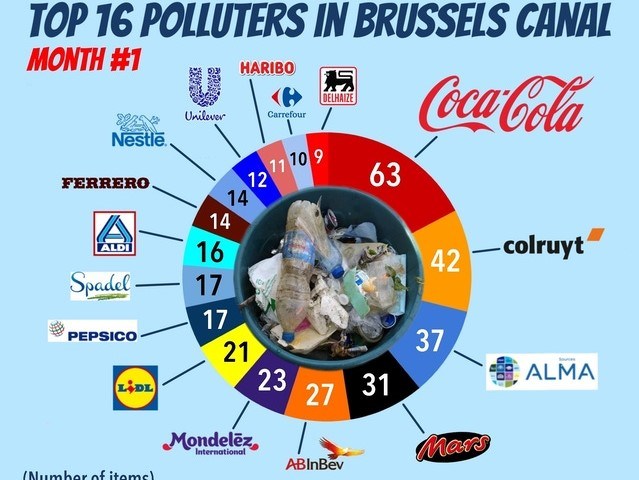The largest share of the pollution recovered from the canal in Brussels originates with Coca-Cola, according to the group that works to remove pollution waste from the city’s waterway.
The group, Canal It Up, takes to the water in kayaks to remove waste from the thoroughfare, has carried out a survey of the origins of that waste, and found that the largest share comes from the US-based soft drinks behemoth.
Of course, no one is suggesting that the Coca-Cola company is throwing used plastic bottles in the canal in Brussels. That responsibility lies with careless, unthinking or scofflaw individuals.
According to a count of the rubbish the kayakers scoop from the waterway, Coca-Cola produced the largest quantity of rubbish, principally plastic drinks bottles and cans. In second place came Colruyt (plastic shopping bags).
Lower down the table are household names like Mars, AB InBev, Lidl, Aldi, Nestle and Unilever. All of the major supermarket brands are represented, whether their waste is plastic bags or shopping trolleys.
The findings in the Brussels canal match very closely with the findings of the international group Break Free From Plastic, whose top ten includes Coca-Cola, Pepsico, Nestlé, Unilever, Mondelez and Mars – all of which are in the Canal It Up top ten.
The group is now calling for a revival of the idea of a deposit system on drinks bottles and cans, which has been raised several times and has always been quashed by the retail federation, whose members would have to administer it.
“A deposit would solve 40% of the problem because you give a value to waste,” Pieter Elsen of Canal It Up told Bruzz.
“Every company would get its products back for reuse. But for this, a new logistics system must be set up everywhere. In Germany and the Netherlands, they already work with a deposit. An experiment in Belgium is not necessary. Belgians are no different from Germans, set up the system and Belgians will use it.”
But according to Fost Plus, which administers the system of recyclable plastic waste in Brussels, a deposit system would miss a large part of the problem.
“Deposit focuses exclusively on beverage packaging, which is a misleadingly visible part of the waste. But litter is much broader than drinks packaging, and deposits cannot offer a solution for those other sources. We therefore advocate for a holistic approach, in which each party accepts its responsibility: the citizen, the industry and the government. Only in this way can we bring about the change in mentality required to help get rid of unnecessary waste.”

